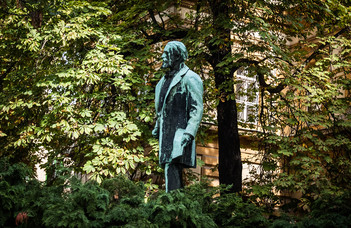About our institute
ELTE Institute of Germanic Studies

About
Since its founding in 1992, the Institute of Germanic Studies has become one of the most prominent academic centers for German studies education and research in Hungary. The institute offers comprehensive undergraduate and postgraduate programs.
Its research areas span various fields of both diachronic and—especially—synchronic linguistics (including grammar studies, dialectology, sociolinguistics, lexicography, lexicology, pragmatics, and text linguistics), as well as several subfields of literary and cultural studies (such as literary theory, narratology, German–Hungarian cultural relations, and regionalism).
History
Teaching
In addition to intensive practical language skills, our institute provides students with comprehensive knowledge of the most important areas of German culture and its development; the structure and historical development of the language, and the rules of its use; research and achievements in the field of German linguistics; the history, periods, authors and works of German literature; methods and trends in general literary studies in German-speaking countries; and the basic knowledge required to develop a multifaceted, inter- and multidisciplinary practical and theoretical approach to the subject. Equipped with their knowledge and skills, graduates can not only pursue careers in the field of education, but also in many areas of cultural life (publishing, written and visual media, cultural institutions, public administration and business), and the most outstanding graduates have the opportunity to carry out academic research as part of their doctoral studies.
The purpose of the bachelor's programme is to train professionals with a wide range of knowledge, fluency in foreign languages and the ability to work successfully in a variety of fields, including business, academia, tourism, international communication, and print and electronic media, and who are able to continue their studies successfully in the master’s programme.
Overview of study programs
German Studies Bachelor's Program – BA (6 semesters undergraduate program)
- German
- German as a minority language
- Dutch Studies: Dutch–Flemish language, literature, and culture
-
Scandinavian Studies: Danish, Norwegian, and Swedish language, literature, and culture
German Studies Minor (5 semesters)
Available for students not majoring in German Studies; can be started from the 1st semester.
Master's Program (BA + 4 semesters)
-
Master's in German language, literature, and culture
-
Master's in German minority language and literature
-
Master's in Dutch Studies
-
Master's in Scandinavian Studies
-
Teacher training:
-
German as a foreign language
-
German as a minority language
-
PhD / Doctoral Program (MA + 6 semesters)
Available in all fields.

